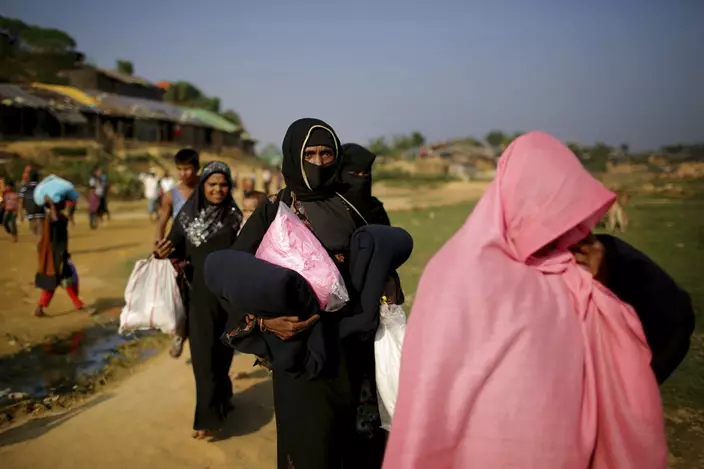Pope Francis has added in a private meeting with Myanmar's military chief during his upcoming trip to the region in an indication that the Vatican views the crackdown on Rohingya Muslims as a military operation distinct from the will of the civilian government of Nobel laureate Aung San Suu Kyi.
The Vatican also confirmed Wednesday that Francis would meet with Rohingya Muslims during an interreligious meeting in neighboring Dhaka, Bangladesh, on Dec. 1.
Myanmar's Catholic leaders have urged Francis against using the term "Rohingya," calling it "political" and "contested."

Pope Francis delivers his speech during his weekly general audience in St. Peter square at the Vatican, Wednesday, Nov. 22, 2017. (AP Photo/Andrew Medichini)
Vatican spokesman Greg Burke declined to say if Francis would use "Rohingya" during the visit, which begins Monday with Francis' arrival in Yangon and ends Dec. 2 in Dhaka.
Myanmar's government and most of the Buddhist majority say the members of the Muslim minority are "Bengalis" who migrated illegally from Bangladesh and don't acknowledge the Rohingya as a local ethnic group even though they have lived in Myanmar, also known as Burma, for generations.
But Francis has used the term "Rohingya" in the past, and Burke used it in a briefing outlining the visit Wednesday and said: "It's not a prohibited word."
Francis' visit was in the works before the start of the latest violence, which began with a series of attacks Aug. 25 by Rohingya insurgents against security positions in Rakhine state. Myanmar security forces responded with a scorched-earth campaign against Rohingya villages that the U.N., U.S. and human rights groups have criticized as textbook "ethnic cleansing."
More than 620,000 Rohingya have fled to neighboring Bangladesh, where they are living in squalid refugee camps.
Burke declined to enter into specifics about the Vatican's view of the violence. Francis has in the past strongly condemned the "persecution of our Rohingya brothers," denounced their suffering and called for them to receive "full rights."
Burke said Myanmar's Catholic cardinal, Charles Bo, had proposed during a weekend audience with Francis that he meet with Gen. Min Aung Hlaing, Myanmar's powerful military chief who is in charge of operations in Rakhine.
Previously, Francis was only expected to meet with Suu Kyi and deliver a speech to Myanmar authorities, civil society and diplomats, at which military leaders would be expected to attend.
Francis agreed to Bo's suggestion and the meeting with the general was added in on the morning of Nov. 30, Burke said. Bo also proposed an interreligious meeting with members of Myanmar's different faith communities, and that too was added in the morning of Francis' first full day in Myanmar, Nov. 28.

Rohingya Muslim women carry blankets and other supplies they collected from aid distribution centers in Kutupalong refugee camp in Bangladesh, Tuesday, Nov. 21, 2017. Since late August, more than 620,000 Rohingya have fled Myanmar's Rakhine state into neighboring Bangladesh, seeking safety from what the military described as "clearance operations." (AP Photo/Wong Maye-E)
Bo, the top-ranked churchman in Myanmar, has defended Suu Kyi against what he termed "unfair" criticism leveled against her internationally and says she represents Myanmar's only hope for moving toward democracy.
He has said she has no constitutional right to speak out against the military and was maneuvering in the best possible way to negotiate improvements not only for Rohingya but Myanmar's other minorities, Catholics included. Catholics represent about 1.27 percent of the population.


